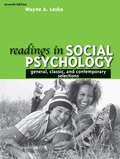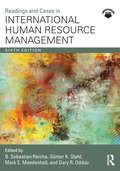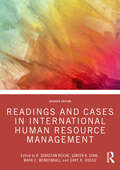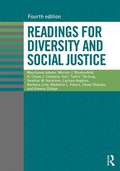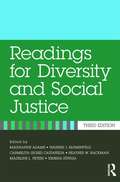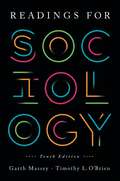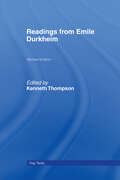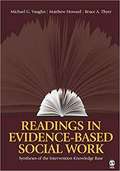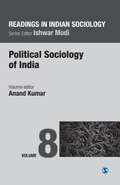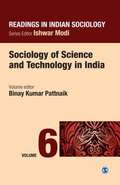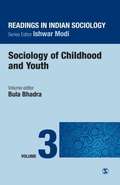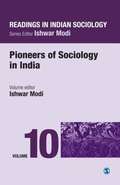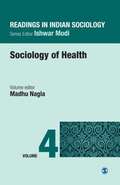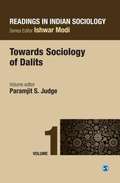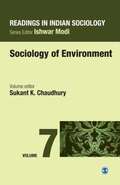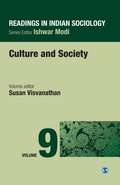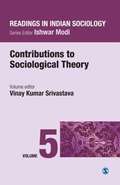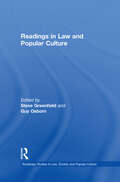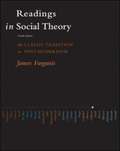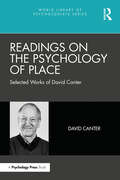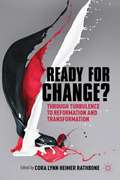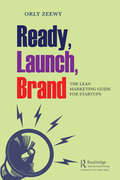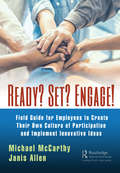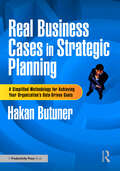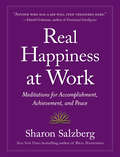- Table View
- List View
Readings In Social Psychology: General, Classic, And Contemporary Selections
by Wayne A. LeskoThis collection of readings gives students exposure to a wide variety of perspectives in the field of social psychology. Each of the fifteen chapters begins with an introduction and is followed by three articles: one general (popular), one classic, and one contemporary. The articles are followed by critical questions designed to facilitate comprehension and encourage discussion. The use of both popular readings and research articles provides students with a broad range of views and theories within the discipline of social psychology. The topical organization of the collection directly parallels Baron/Byrne/Branscombe's Social Psychology, Eleventh Edition. However, Readings in Social Psychology can be used with any social psychology textbook, or as a stand-alone reader in courses that do not use full textbooks.
Readings and Cases in International Human Resource Management
by B. Sebastian Reiche, Günter K. Stahl, Mark E. Mendenhall and Gary R. OddouThe new edition of Readings and Cases in International Human Resource Management examines the interactions between people, cultures, and human resource systems in a wide variety of regions throughout the world. Taking account of recent developments in the international human resources management (IHRM) field, the sixth edition will enable students to meet the international challenges they will face in the workforce, and sensitize them to the complexity of human resource issues in the era of globalization. Features include: New readings and case studies that account for recent changes in the field, positioned alongside "tried and true" material. An increased focus on cross-cultural diversity and tools to bridge "social distance" between team members. Supplemental material and teaching notes, available for download, to enhance instructors’ abilities to use the readings and cases with their students. With well-known contributors and field experts, this is the ideal accompaniment for any class in international human resource management, organizational studies, or international business.
Readings and Cases in International Human Resource Management
by B. Sebastian Reiche, Günter K. Stahl, Mark E. Mendenhall, and Gary R. OddouThis new edition of Readings and Cases in International Human Resource Management is a classic edited textbook, taking account of recent developments in the international human resources management (IHRM) field, such as the pandemic, the role of diversity, equity, and inclusion, as well as climate change. It includes a range of key readings that are essential for understanding the field and contextualizes each one with a selection of real-life case studies that demonstrate their meaning and impact in practice. The book aims to sensitize the reader to the complex human resource issues that exist in the global business environment. To that end, it strives to publish “tried and true” readings and cases that provide stimulating and intellectually challenging material and are written in ways that engage both the student and the instructor. Key features include: New readings and case studies that account for recent changes in the field, positioned alongside “tried and true” material Integration of contemporary themes such as remote working, digitization, sustainability, and social issues throughout the book An expanded introductory chapter, new discussion questions, and consistent pedagogy throughout Supplemental tutor support material, additional cases, and teaching notes to enhance instructors’ abilities to use the readings and cases with their students Bringing together well-known contributors and field experts into one encompassing text, this textbook is ideal for any class in international human resource management, international organizational behaviour, or international business. This seventh edition is thoroughly updated to enable students to understand the complexity of human resource issues in the post-pandemic era of global, remote, and technology-mediated working.
Readings for Diversity and Social Justice
by Heather W. Hackman Madeline L. Peters Ximena Zuniga Barbara J. Love D. Chase J. Catalano Larissa E. Hopkins Davey Shlasko Maurianne Adams Warren J. Blumenfeld Keri DeJongCurrent topics and events such as the Black Lives Matter movement, workplace immigration raids, gentrification, wealth inequality, the disability rights of prisoners and inmates, and the Keystone XL pipeline protests, additional resources and short classroom-friendly videos that further complement the readings in each section.A holistic approach to sexism, gay, lesbian, trans and gender-queer oppression that challenges widely-held assumptions about the usual practice of separating analyses of sex and gender binaries. A more optimistic focus on the role of social justice at all levels of society, whether personal, institutional local, or global, and the intersections among them.
Readings for Diversity and Social Justice (Third Edition)
by Maurianne Adams Warren Blumenfeld Carmelita Castaneda Heather W. Hackman Madeline L. Peters Ximena ZunigaFor more than a decade, Readings for Diversity and Social Justice has been the trusted, leading anthology to cover the full range of social oppressions from a social justice standpoint. With full sections dedicated to racism, sexism, classism, heterosexism, and ableism, as well as transgender oppression, religious oppression, and adult and ageism, this bestselling text goes far beyond the range of traditional readers. New essay selections in each section of this third edition have been carefully chosen to keep topic coverage timely and readings accessible and engaging for students. The interactions among these topics are highlighted throughout to stress the interconnections among oppressions in everyday life. Retaining the key features and organization that has made Readings for Diversity and Social Justice an indispensable text for teaching issues of social justice while simultaneously updating and expanding its coverage, this new edition features: Over 20 new selections considering current topics and events such as immigration trends, racial profiling, student debt, Occupy Wall Street and global GLBT rights. An updated companion website with additional resources, including video clips that further complement the readings in each section. Strong and accessible section introductions to highlight key points and relate the essential concepts of any given topic to other forms of oppression. An explicit emphasis on the interconnectedness of social identity and social inequality throughout, with a second table of contents that notes the intersections among readings. Offering over one-hundred and thirty selections from some of the foremost scholars in a wide range of fields, Readings for Diversity and Social Justice is the indispensible volume for every student, teacher, and social justice advocate.
Readings for Sociology (Tenth Edition)
by Garth Massey Timothy O'BrienThe perfect mix of classic and contemporary readings With selections from popular and academic journals as well as lively book excerpts, Readings for Sociology reveals the complexities of our social world and offers insights into sociological analysis. Readings for Sociology is comprehensive in scope, offering a wide range of selections on the standard topics in the introductory course while delving deep into issues of inequality. With 30 percent new readings—including pieces from Tressie McMillan Cottom, Jennifer Lee, and Victor Ray—the Tenth Edition maintains a focus on inequality, exploring issues as wide-ranging as norms of beauty, the politics of food, and immigrant identities. This purchase offers access to the digital ebook only.
Readings from Emile Durkheim
by Kenneth ThompsonEmile Durkheim is regarded as a founding father of sociology, and is studied in all basic sociology courses. This handy textbook is a key collection of translations from Durkheim's major works.
Readings in Evidence-based Social Work: Syntheses of the Intervention Knowledge Base
by Bruce A. Thyer Michael G. Vaughn Matthew O. HowardExposing readers to "what works" across a wide range of practice domains, Readings in Evidence-Based Social Work meets a growing need within schools of social work to incorporate the latest research on evidence-based practice into the curriculum. This one-of-a-kind reader synthesizes current knowledge, adds editorial commentary and questions, and presents state-of-the-art material to help students better understand which social work interventions work and why.
Readings in Indian Sociology
by Anand KumarPolitical Sociology of India, is a selection of essays on polity and society which represents outstanding contributions of three generations of eminent scholars about political sociology of India. The selected authors also include some of the leading lights of the Indian Sociological Society. The papers selected for the volume provide a holistic view of the major concerns and perspectives of eminent post-colonial sociologists as well as the range of diversities in conceptualizing and analyzing the complexities of Indian social formation.
Readings in Indian Sociology
by Binay Kumar PattnaikSociology of Science and Technology in India, is a collection of 12 articles in Sociology of Science and Technology (SST). It throws light on the major themes of SST, such as, role of science (theoretical), scientific community in India, productivity patterns in Indian Science and Technology (S&T) research, and S&T unleashing social change in India.
Readings in Indian Sociology
by Bula BhadraSociology of Childhood and Youth, is one of the first of its kind that provides sociological articulations on the Indian child and young, along with the accompanying multifaceted discourses on childhood and youth situating it in the historical experience of India. This volume will be welcomed as a ground-breaking effort for opening doors for critical thinking and novel works in an area which is one of the most challenging and motivating concern of contemporary India and also for our sociological imagination.
Readings in Indian Sociology
by Ishwar ModiIt is through the contributions of the pioneering scholars that not only a particular discipline derives its name but also the foundations on which a particular discipline is built and grows. G.S. Ghurye (1893-1983), Radhakamal Mukerjee (1889-1968), D.P. Mukerji (1894-1961) and M.N. Srinivas (1916-1999) are known as the pioneers of sociology in India. It is mainly on them and on their contributions that the contemporary sociologists in India have extensively published in the issues of the Sociological Bulletin. Volume 10, Pioneers of Sociology in India, contains a selection of papers that have been published since 1977on these founding fathers of Sociology in India.
Readings in Indian Sociology
by Madhu NaglaSociology of Health, contains empirical and theoretical articles that apply sociological concepts and methods to the understanding of health and illness and the organization of medicine and healthcare. Further the articles also try to explore the understanding of the process by which social practices and human health are related.
Readings in Indian Sociology
by Paramjit S JudgeTowards Sociology of Dalits, features 11 select articles with a comprehensive introductory chapter which provide a panoramic outline of the content of Dalit studies in India over time and space. The location of Dalits has been inseparably linked with the caste and economy of Indian society giving rise to the practice of untouchability duly supported by tradition and religious ideology. Three major issues discussed in the various chapters of this volume are untouchability and exclusion, conflict and change.
Readings in Indian Sociology
by Sukant K ChaudhuryEnvironment is of great concern to every society because people depend upon it for resource mobilization, livelihood and existence. Our environment or ecosystem is endangered because of population pressure, migration, technological changes, changes in land use for livelihood practices and depletion and destruction of resources due to mega projects. Today, more than ever, there is greater need for sustainable development. Volume 7, Sociology of Environment, addresses these issues and will be of interest to both researchers and activists in these areas.
Readings in Indian Sociology
by Susan VisvanathanCulture and Society, shows us that the questions of the nation state must have precise emblems, or facts, by which it is studied. These motifs may be leisure, propaganda, film, theatre, cartoons, ideologies of race and caste, as well as the continuing production of a variety of materials, which inform lay readers as well as trained professionals, how eclectic the subject matter of Sociology is. Well-known sociologists, who will be remembered for their astute sense of the here and now, bring to the volume its intense intellectual space of negotiating the cultural dynamics of India as it unfolds in the last decades of the 20th century and beginning of the 21st century.
Readings in Indian Sociology
by Vinay Kumar SrivastavaContributions to Sociological Theory, aims to quell the popular belief that sociologists and their journals are shy of making a contribution to theory--they are mere empiricists. The volume introduces the dimensions and trajectories of the multiplicity of theory in its sumptuous Introduction. The volume has two sections: the first deals with the contribution of the Sociological Bulletin to the conceptual framework of sociology, and the second is the contribution made to the writings of the Western thinkers who have considerably influenced Indian sociology.
Readings in Law and Popular Culture (Routledge Studies in Law, Society and Popular Culture)
by Guy Osborn Steven GreenfieldReadings in Law and Popular Culture is the first book to bring together high quality research, with an emphasis on context, from key researchers working at the cutting-edge of both law and cultural disciplines. Fascinating and varied, the volume crosses many boundaries, dealing with areas as diverse as football-based computer games, Buffy the Vampire Slayer, digital sampling in the music industry, the films of Sidney Lumet, football hooliganism, and Enid Blyton. These topics are linked together through the key thread of the role of, or the absence of, law - therefore providing a snapshot of significant work in the burgeoning field of law and popular culture. Including important theoretical and truly innovative, relevant material, this contemporary text will enliven and inform a legal audience, and will also appeal to a much broader readership of people interested in this highly topical area.
Readings in Social Theory: The Classic Tradition to Post-Modernism, 4th edition
by James FarganisThis anthology of primary readings in sociological theory covers the major theorists and schools from classic to contemporary, modernist, and postmodernist, in a chronological organization. Its comprehensive coverage makes this book appealing as a main text for professors who want to encourage students to read and interpret original sources or as a supplement for those who use a traditional main text.
Readings on the Psychology of Place: Selected Works of David Canter (World Library of Psychologists)
by David CanterIn the World Library of Psychologists series, international experts present career-long collections of what they judge to be their most interesting publications – extracts from books, key articles, research findings and practical and theoretical contributions. In this fascinating volume, Professor David Canter refl ects on a career that has earned him an international reputation as one of the U.K.’s most eminent applied social psychologists and a pioneer in the fi eld of environmental psychology, through a selection of papers that illustrate one of the foundational themes of his research career: the psychology of place. Split into four parts, each with a new introduction written by the author, the book provides insights into theories, methods and applications of place psychology. Covering a range of publications from early research in the 1960s up to recent explorations, this volume provides the unfolding research that elaborates this seminal theory, offering rich perspectives on how places gain their significance and meaning. Featuring specially written commentary by the author contextualizing the selections and providing an intimate overview of his career, this collection of key publications offers a unique and compelling insight into decades of ground-breaking work, making it an essential resource for all those engaged or interested in the study of places.
Ready for Change?
by Cora Lynn Heimer RathboneAimed at managers and executives wanting insight into how to better drive change at the micro and macro level, Ready for Change? provides guidance in understanding the factors within different business disciplines that enable and disable lasting change through examples of good practice and 'not so good' practice within real organisations.
Ready, Launch, Brand: The Lean Marketing Guide for Startups
by Orly ZeewyYou may be familiar with the Silicon Valley expression about the iterative approach to software development, "We’re learning to fly the plane while we’re building it." If so, think of a startup—with all its moving parts, phases, and personalities—as flying a plane, while you’re building it, booking passengers, marketing the airline, interviewing co-pilots, and serving coffee. In this book, Orly Zeewy navigates the turbulence and provides a flight plan so you know when you’ve landed in the right airport. Orly Zeewy is a brand architect who helps startups cut through the noise. She has worked with dozens of founders and entrepreneurs to uncover their brands’ DNA. In Ready, Launch, Brand: The Lean Marketing Guide for Startups you will learn how to close the marketing gaps that can slow down sales and make it harder to scale your business. Orly shares her brand process for building the right team, attracting brand evangelists, and cultivating a sustainable company culture. Prior to starting her brand consulting practice, Orly ran the award-winning Zeewy Design and Marketing Communications firm and directed marketing programs for national clients such as CIGNA, Kraft Foods, and Prince Tennis. She has lectured at the Wharton School of Business at the University of Pennsylvania, taught at the Charles D. Close School of Entrepreneurship at Drexel University, and been featured in the business section of the Philadelphia Inquirer.
Ready? Set? Engage!: A Field Guide for Employees to Create Their Own Culture of Participation and Implement Innovative Ideas
by Michael McCarthy Janis AllenAll employees want themselves and their colleagues to be better engaged at work, but most just can’t get past the talking stage to actually developing an effective plan. This book is a step-by-step "how-to" guide for those who develop and complete projects – not just supervisors and continuous improvement professionals. Like instructions for "assembly required" projects, this book takes you one step at a time into creating a project that makes your work easier, better, and more satisfying. This book identifies the benefits of—and strategies for—developing engaged employees who will implement and sustain your Lean processes. You will learn and practice tools for creating and sustaining engagement and how to align your goals with your strategy, ensuring that your desired future becomes a reality. In addition, after reading this book, you’ll be able to: Recognize barriers to building engaged teams and individuals, and then select strategies for overcoming these hurdles. Practice communication and team relationship skills that will help you to nurture long-term process improvements. Gain information about key listening skills, as well as steps to enhance recognition systems.
Real Business Cases in Strategic Planning: A Simplified Methodology for Achieving Your Organization's Data-Driven Goals
by Hakan ButunerThis book shows how systematic strategic planning (SSP) can be used on real-world projects for professionals at any skill level. It illustrates how this systematic methodology and its analysis tools—using workshop and brainstorming approaches—can be easily understood and universally applied to any type of business. Rather than explaining the methodology and its tools, the author succinctly shows how to use the simplified version of his methodology for developing strategic plans. But, perhaps more importantly, the reader is shown how to identify which circumstances require the use of particular tools and also how to target them directly to achieve effective results. The SSP methodology and the use of a workshop approach, real-world strategic planning projects, and working forms are presented to guide the reader through preparing the strategic plan for existing or future business.The first part of the book provides an overall framework and briefly describes some of the sections of the systematic pattern of strategic planning. In addition, it explains the use of a workshop approach for strategic planning based on SSP principles. The second part details case studies of strategic planning projects from real-world organizations across a variety of industries. Most of the organizations used both the simplified version of the SSP methodology and the techniques, while others benefited strictly from customizing the SSP methodology.
Real Happiness at Work: Meditations for Accomplishment, Achievement, and Peace
by Sharon SalzbergReal Happiness at Work brings the profound benefits of meditation to an area where people could use it most—the workplace. And it’s written by one of the world’s leading meditation teachers.A follow-up to Real Happiness, the New York Times bestseller, Sharon Salzberg’s Real Happiness at Work is a practical guide to improving work life through mindfulness, compassion, and ingenuity. It’s about being committed without being consumed, competitive without being cruel, managing time and emotions to counterbalance stress and frustration. It shows readers how to be more creative, organized, and accomplished in order to do better, more productive work.Dividing the idea of workplace satisfaction into eight pillars, Real Happiness at Work is filled with secular wisdom; core meditations on broad themes like motivation, awareness, and seeing the good in others; and more than a dozen exercises, including Moving From Me to We and When Things Go Wrong. Sprinkled throughout the book are short “stealth” meditations, the kind that are quick, private, and doable anywhere—“Let the phone ring three times, follow your breath, then pick it up” and “For an upcoming one-on-one conversation, resolve to listen more and speak less.”Even the best jobs are filled with stress, tough deadlines, impatient bosses, seemingly endless meetings—all the ills of harried life. But as science increasingly shows, meditation is the antidote.
